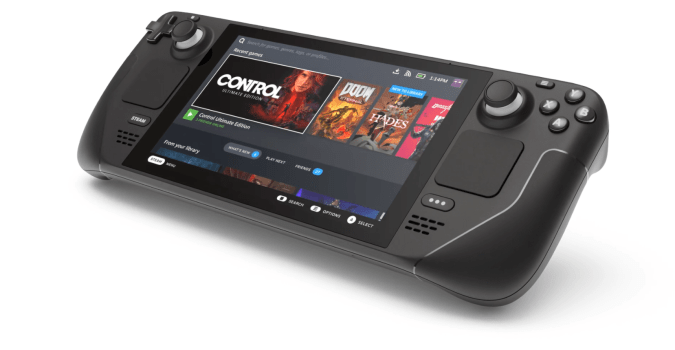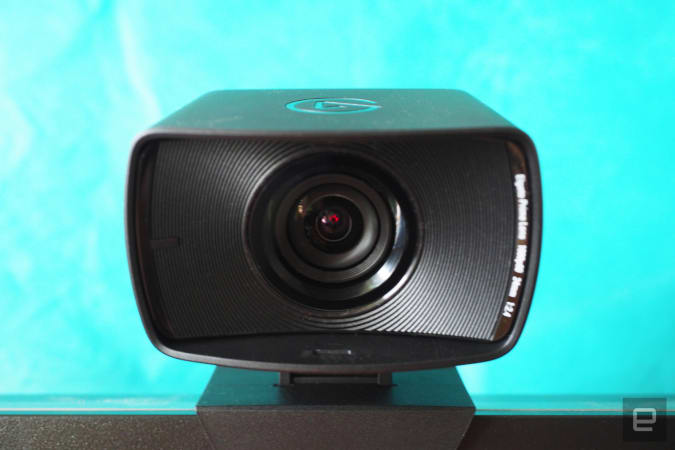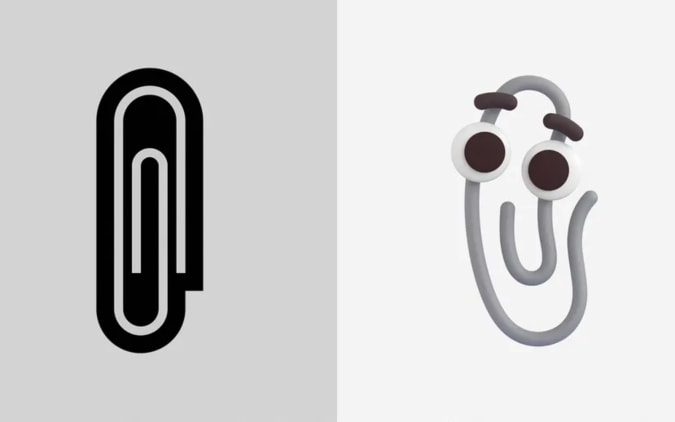The Morning After: Valve made a $399 handheld gaming PC | Engadget
Valve just surprised us all with a handheld console. The $399 will arrive in December, with availability expanding to more regions later.
Looking like some unholy alliance of Sega’s Game Gear and the Nintendo Switch, the hardware includes a seven-inch touchscreen at 1,280 x 800 resolution at 60Hz refresh rate. There is no shortage of control options either, with dual thumbsticks, two pretty large square trackpads, an old-school directional pad, four main face buttons, triggers and a quartet of grip buttons.

Valve
Perhaps unsurprisingly, it’s just shy of a foot long. Eesh. Valve has ensured there’s enough power inside to tempt PC gamers that already have an expansive Steam library. There’s an AMD 2.4-3.5GHz processor and a 1.0 to 1.6GHz GPU with eight RDNA 2 compute units. There’s 16GB of LPDDR5 RAM inside, too. Valve promises a battery life of between two and eight hours on a single charge, depending on how much power you need for your games. Given the power many AAA PC games require, you can probably expect a lot of experiences to hover around the lower estimates.
While the Steam Deck might not be as powerful as your gaming PC, Valve is using Proton, a compatibility layer that lets games run without developers having to do any work porting titles across — you’ll apparently have access to your full library of games. This price point makes it slightly more expensive than the Switch, and the same price as the digital-only PS5. Due to its Steam hooks, however, it’s a very different proposition. How well will PC games play on a seven-inch handheld?
— Mat Smith
It’s good hardware for streamers.

Kris Naudus / Engadget
Elgato’s first $200 web camera isn’t all that unique. It’s a chunky rectangular box you can easily clip on top of a monitor, and it lacks a mic or anything approaching 4K resolution. It shoots 1080p at 60 fps, which should be enough for streamers who use the camera output as picture-in-picture. Continue reading.
The film features three quotes that Bourdain never recorded.
Today, Roadrunner: A Film About Anthony Bourdain opens in US theatres. Like many documentaries, the film pieces together archival footage, including interviews and show outtakes, to tell the story of its subject in their own words. It also includes words Bourdain never spoke to a camera before his suicide in 2018, and yet you’ll hear his voice saying them. The film’s director, Morgan Neville, explained to The New Yorker that there were three quotes he wanted Bourdain to narrate, and to do so, Neville recreated them with software instead, making an AI model of Bourdain’s voice from existing audio. The system was apparently fed about a dozen hours of audio to an AI model. Continue reading.
Emojipedia has shared a list of draft characters

Emojipedia
Tomorrow is World Emoji Day, and it’s the cut-off for new draft emoji options. The list includes a melting smiley face (thanks global warming), a saluting emoji, a disco ball, beans and new pointing fingers, and there are more diverse skin tone options for existing hand emojis. That’s notable as, due to technical limitations, it was one of the few characters you couldn’t modify with a skin tone in previous versions of Unicode. Continue reading.
Think paperclip, think Clippy.

Microsoft / The Verge
Twenty years after being retired from Microsoft Office, Clippy is back to ruin your day. As part of Microsoft’s update to 1,800 emoji, the one-time assistant will replace the paperclip emoji in Office, Teams and Windows. Microsoft is updating its emoji library to make the characters 3D and add animation to around 900 of the icons. The company said it plans to roll out the new characters to Windows and Teams sometime in the upcoming holiday season. Continue reading.
And social companies need to do more to stop it.
US Surgeon General Dr. Vivek Murthy has issued an advisory warning of the dangers posed by health misinformation, calling it an “urgent threat” that social media companies and technology platforms need to do more to address. The advisory includes a 22-page report on steps that individuals, health organizations, researchers and journalists can take to help mitigate the spread of misinformation. Continue reading.
But wait, there’s more…
All products recommended by Engadget are selected by our editorial team, independent of our parent company. Some of our stories include affiliate links. If you buy something through one of these links, we may earn an affiliate commission.
For all the latest Technology News Click Here
For the latest news and updates, follow us on Google News.

